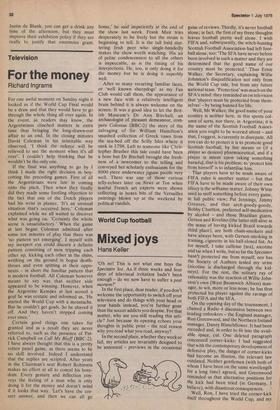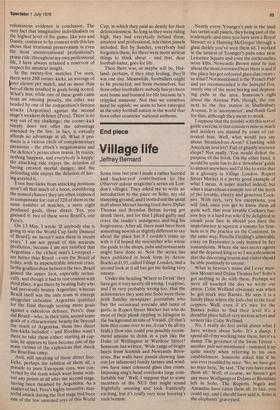World Cup football
Mixed joys
Hans Keller
'Oh no! This is not what one buys the Spectator for. As if three weeks and four days of televisual irritation hadn't been enough — do we now have to suffer a post mortem?'
In the first place, dear reader, if you don't welcome the opportunity to switch off your television and do things with your head or your hands instead, you're further gone than the soccer addicts you despise. For that matter, why are you still reading this article? Just because its opening echoes your thoughts in public print — the real reason why you read what you read, anyway?
In the second place, whether they work or fail, my articles are invariably designed to be antenatal — previews in the occasional guise of reviews. Thirdly, it's never football alone; in fact, the first of my three thoughts leaves football pretty well alone. I wish FIFA and, subsequently, the witch-hunting Scottish Football Association had left foot ball alone, too: 'The SFA have never before been involved in such a matter and they are determined that the good name of our country must be protected.' Thus Ernie Walker, the Secretary, explaining Willie Johnston's disqualification not only from the World Cup side, but from any future national team. 'Protection' was much on the SFA's mind: they reminded us on television that 'players must be protected from themselves' — by being banned for life.
Well, Mr Walker, the good name of your country is neither here, in this sports column of sorts, nor there, in Argentina; it is the name of the Scottish Football Association you ought to be worried about — and that, I suggest, is currently in disrepute. All you can do to protect it is to promote good Scottish football, by fair means or (if a player so desires) pharmaceutical, and if a player is intent upon taking something harmfu), that is his problem: to 'protect him from himself is to infantilise him.
That players have to be made aware of FIFA rules is another matter — but that FIFA have to be made aware of their own idiocy is the selfsame matter. Johnny White used to sniff something before every game, in full public view; Pat Jennings, Jimmy Greaves, and that arch-goody-goody, Bobby Charlton, preferred self-medication by alcohol — and those Brazilian giants, Gerson and Rivelino (the latter still alive in the sense of having kicked Brazil towards third place), are both chain-smokers and have always been, with Gerson smoking in training, cigarette in his half-closed fist. As • for myself, I take caffeine (tea), nicotine and tar when I write, but so far the Spectator hasn't protected me from myself, nor has the Society of Authors tested my urine (nicotine is discharged through the kidneys). For the rest, the solitary ray of rationality was the reaction of Willie Johnston's own (West Bromwich Albion) manager, to wit, more or less none; he has thus protected his player against the ravings of both FIFA and the SFA.
On the opening day of the tournament, I chaired a Radio 4 discussion between two leading onlookers — the England manager, Ron Greenwood, and the Northern Ireland manager, Danny Blanchflower. It had been recorded and, in order to fit into the available space, cut. One deleted paragraph concerned corner-kicks: I had suggested that with the contemporary development of defensive play, the danger of corner-kicks had become an illusion, the relevant law outdated. Neither gentlemen (with both of whom I have been on the same wavelength for a long time) agreed, and Greenwood reminded us that alternative positions for the kick had been tried (in Germany, I believe), with disastrous consequences.
Well, Ron, I have tried the corner-kick itself throughout the World Cup, and my voluminous evidence is conclusive. The very fact that imaginative individualists on the highest level of the game, like you and Danny, continue to be content with this law shows that irrational preservatism is even the most unconventional professional's prime risk: throughout my own professional life, I have always retained a reservoir of respect for amateur insight.
In the twenty-five matches I've seen, there were 288 corner-kicks, an average of lover eleven per match, and no more than two of them resulted in goals being scored. What's less, while one of these goals came from an ensuing penalty, the other was headed by one of the competition's fiercest attacks (Argentina) against the second stage's weakest defence (Peru). There is no way out of my challenge: the corner-kick simply does not offer the advantage intended by the law; in fact, it virtually affords no advantage at all. What it produces is a vicious circle of complementary paranoias — the attack's megalomania and the defence's persecution mania. In reality, nothing happens, and everybody is happy: the attacking side enjoys the delusion of having created mortal danger, and the defending side enjoys the delusion of having averted it.
Even free-kicks from attacking positions aren't all that much of a boon, considering the missed chances they are often supposed to compensate for: out of 328 of them in the same number of matches, a mere eight produced goals, three direct. Yes, you guessed it: two of these were Brazil's, one Peru's.
On 13 May, I wrote 'If anybody else is going to win the World Cup fairly [instead of Brazil], we haven't seen them in recent years.' I am not proud of this accurate prediction, because I am not satisfied that Argentina — the richest man's Liverpool — are better than Brazil — even the Brazil of today, with its impenetrable internal crisis. In the goalless draw between the two, Brazil gained the upper foot, especially .technically, and though it had to rest content with third place, it got there by beating Italy who had previously beaten Argentina; whereas Brazil itself was the only team to emerge altogether unbeaten. Argentina qualified for the final through scoring more goals against a ridiculous defence, Peru's, than did Brazil — who, in their turn, scored some goals of a characteristic beauty far beyond the reach of Argentina, those two direct free-kicks included — and Rivelino wasn't there to take them either: starting as captain, he appears to have become one of the main victims of the explosions that shook the Brazilian camp.
And, still speaking of those direct freekicks, perhaps the subtlest of them all, a miracle to poor European eyes, was converted by the team which went home without any points at all after the second stage, having been thrashed by Argentina. As a matter of fact, Peru's highly inventive, masterful attack during the first stage had been one of the few unmixed joys of this World Cup, in which they paid so dearly for their defencelessness. So long as they were riding high, they had everybody behind them, amateur and professional, television panels included. But by Sunday, everybody had forgotten them, for there were more serious things to think about — and that, dear football-hater, goes for life.
Then there was, or maybe will be, Holland: perhaps, if they stop fouling, they'll win one day. Meanwhile, footballers ought to be protected, not from themselves, but from other footballers: nobody has yet been sent home and banned for life because he's crippled someone. Not that we ourselves need be uppish: we seem to have emerged as the only football nation in the world that boos other countries' national anthems.







































 Previous page
Previous page